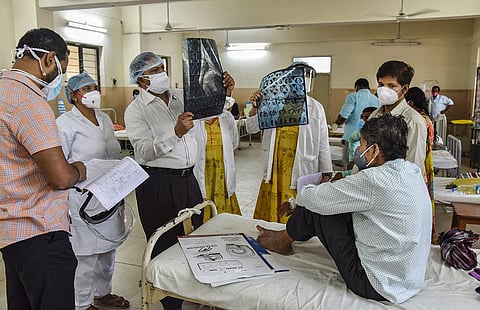

CHENNAI: Hospitals in and around Chennai are saying that there is a significant rise in the number of mucormycosis or black fungus cases. Most hospitals The New Indian Express spoke to reported that the number of black fungus cases they have received in May alone is at least five to ten times the number of annual cases they received before the Covid pandemic.
Around 60 cases of patients with black fungus have been found in the six hospitals The New Indian Express spoke to on Thursday. While it is too early to scientifically establish the mortality rate at this point, many experts warn that the disease is lethal once it spreads to the brain.
Once the fungus crosses over into the brain, the mortality can be as high as 70-80 per cent, doctors say. Dr. Mohan Kameswaran, the managing director of Madras ENT Research Foundation, said that it will be very difficult to save a patient if the fungus has spread to the dura mater -- the thick membrane made of dense irregular connective tissue that surrounds the brain and spinal cord.
"The dura mater is like a Lakshman Rekha (a mythological line that one is not allowed to cross)," he commented. He noted that his hospital has received at least 25 cases of mucormycosis in May alone and all of them had uncontrolled diabetes. "We admitted and operated on only 10 patients and only one died so far. But most patients of the black fungus had recovered from Covid and showed up with glucose levels over 500," he said.
He further added that many of them developed the condition because of inappropriate administration of steroids or immunomodulators. In addition to this, he said that there are two possible, but unverified causes for the disease: unsanitary oxygen supply system and new Covid strains messing with the immune system.
Sankara Nethralaya, a not-for-profit missionary institution for eye care, received at least 13 cases of black fungus in the past 10 days, said Dr Nisar Sonam Poonam, Department of Orbit and Oculoplasty. As black fungus grows silently yet rapidly, most patients realise the onset only when they experience disturbances or pain in the vision, when the fungus has already spread to the eyes. "We have lost two patients already and three more had to be redirected to other tertiary care centres as the fungus had already spread to the brain," she said. She also said that before Covid, the hospital would receive only two or three cases of mucormycosis in a year.
"We are already having a shortage of the antifungal drug Liposomal amphotericin B. Without the medicine, mucor patients are a ticking time bomb," she said. Dr Poonam said that a crucial problem with black fungus is the cost of treatment. The quantity of medicine required for treatment, which lasts 14-21 days, is much higher. So it costs more. "This is hard on families especially as they would have spent a lot on Covid treatment. One family asked me to tell for sure if the patient will survive after the treatment as they preferred to give that money to his children who may need it after his death," she rued.
Dr Soundari Sivagnanam from Dr Agarwals Eye Hospital pointed to another serious problem. Black fungus patients who are diagnosed late have to be redirected to tertiary health care centres in cities. Black fungus patients develop complications in the eyes, sinus, throat, brain and paranasal passages. "The disease requires a band of varied expert physicians and multidisciplinary care to treat it," she said. Dr Amar Agarwal, the Chairman and Managing Director of the hospital, added that the rise in cases has been a result of patients self-medicating themselves with steroids.
While the Tamil Nadu government has reported at least nine cases in its hospitals, Sri Ramachandra Institute of Higher Education and Research has reported at least six. Gleneagles Global Health City, received at least nine cases in May and most of them had recovered from Covid.
Dr Ashwin Karuppan, Senior Consultant, Internal Medicine, from the hospital said, "Black fungus is an aggressive disease and we need to act immediately. If patients lose their eyesight, we have to perform radical surgery that might require facial reconstruction," he said. He asserted that swift data sharing at the state level is the need of the hour. "Doctors can exchange information on treating severe cases and easily access the supply chain of antifungal drugs and other treatment requisites," he said.
Dr Karuppan estimated that private hospitals are likely to receive more cases of black fungus as government hospitals are overburdened with Covid cases. "Transparency of data may help us plan and arrange for beds and specialists accordingly," he said.